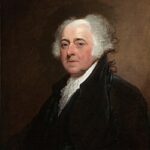The Decision to Choose Diplomacy
In 1798, tensions between America and France reached dangerous heights during the Quasi-War France conflict. French privateers attacked American merchant ships while diplomatic relations collapsed after the XYZ Affair. President John Adams faced immense pressure from his own Federalist Party to declare full war against France. Alexander Hamilton and other party leaders demanded military action to defend American honor. ⚠️ War seemed inevitable as both nations engaged in undeclared naval battles across the Atlantic.
Adams’ Courageous Stand
Despite party pressure, Adams chose a different path in 1799. He sent three commissioners to negotiate directly with French leaders. This decision shocked his Federalist allies who expected military escalation. The president understood that war would devastate America’s fragile economy and military. 📊 The young nation possessed only a small navy compared to European powers. Adams prioritized national interests over party politics, knowing this choice might end his political career.
The Convention of 1800
Adams’ diplomatic gamble succeeded when negotiators signed the Convention of 1800. This treaty officially ended the Quasi-War France hostilities between both nations. The agreement restored peaceful trade relations and prevented costly military expansion. 💰 America avoided spending millions on war preparations and military buildup that would have strained federal finances.
Impact:
Immediate Political Consequences
Adams’ decision to end the Quasi-War France conflict through diplomacy split the Federalist Party permanently. Alexander Hamilton openly criticized the president’s peaceful approach as weakness. Party infighting weakened Federalist unity heading into the 1800 election. 🔥 Hamilton’s faction actively worked against Adams’ reelection campaign, contributing to his electoral defeat. The president lost political support but saved the nation from unnecessary warfare.
Economic and Military Benefits
Peaceful resolution of the Quasi-War France crisis preserved America’s economic growth during crucial early years. Trade with European nations resumed without wartime disruptions or naval blockades. The decision prevented massive military spending that young America could not afford. 💰 Federal revenues remained stable while avoiding war debt that plagued other nations. American merchants returned to profitable Atlantic trade routes previously threatened by conflict.
Long-term Historical Significance
Adams’ diplomatic triumph established important precedents for future American foreign policy decisions. The peaceful resolution demonstrated that negotiation could succeed where military force might fail. This approach influenced later presidents facing similar international crises. 🌍 Historians widely praise Adams for prioritizing national interest over personal political gain. His decision to end the Quasi-War France conflict through diplomacy ranks among the most successful presidential choices in early American history. The precedent of choosing peace over war when possible became a cornerstone of American diplomatic tradition.
